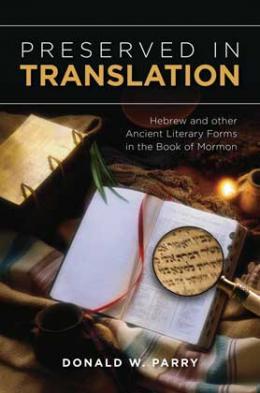Theme Words
Donald W. Perry, “Theme Words,” in Preserved in Translation: Hebrew and Other Ancient Literary Forms in the Book of Mormon (Provo, UT: Religious Studies Center, Brigham Young University; Salt Lake City: Deseret Book), 47‒50.
"O remember, remember" (Helaman 5:9)
Occasionally, Old Testament writers emphasized a theme in a passage by repeating the same word over and over.[1] Sometimes the repeated word is presented in such a subtle way that a hasty reading may obscure its significance. Such frequent usage of a particular word serves to link the several expressions into a unified passage.
Zephaniah 1:7–18, where the word day is used fourteen times, provides us with a prime example of a repeated theme word in the Old Testament. This passage opens and closes with the same expression—“day of the Lord,” establishing the overarching theme. Day of the Lord does not refer to the Sabbath, but to a time of judgment and punishment. In verses 15–16, day is repeated several times:
That day is
a day of wrath,
a day of trouble and distress,
a day of wasteness and desolation,
a day of darkness and gloominess,
a day of clouds and thick darkness,
a day of the trumpet and alarm.
1 Kings 4 provides another example of a repeated theme word: “God gave Solomon wisdom and understanding exceeding much, and largeness of heart, even as the sand that is on the sea shore. And Solomon’s wisdom excelled the wisdom of all the children of the east country, and all the wisdom of Egypt. For he was wiser than all men” (verses 29–31).
Other examples of theme words in Old Testament texts include Genesis 39, which uses hand nine times; Zechariah 8, which repeats truth four times (see verses 3, 8, 16, and 19); Psalm 119, which repeats the words Lord or O Lord twenty-four times; and Proverbs 28, which uses understand or understanding four times (see verses 2, 5, 7, and 11; the word wise in verse 7 in the KJV should read “understanding”).
Book of Mormon authors also employed this forceful rhetorical device. A powerful example is found in Helaman 5, where remember is reiterated fifteen times in a span of ten verses:
For they remembered the words which their father Helaman spake unto them. And these are the words which he spake:
Behold, my sons, I desire that ye should remember to keep the commandments of God; . . . and this I have done that when you remember your names ye may remember them; and when ye remember them ye may remember their works; and when ye remember their works ye may know how that it is said, and also written, that they were good. . . .
O remember, remember, my sons, the words which king Benjamin spake unto his people; yea, remember that there is no other way nor means whereby man can be saved, only through the atoning blood of Jesus Christ, who shall come; yea, remember that he cometh to redeem the world.
And remember also the words which Amulek spake. . . .
And now, my sons, remember, remember. . . .
And they did remember his words. (verses 5, 6, 9, 10, 12, 14)
The recurrence of voice in 3 Nephi 11:3 describes the unique voice of the resurrected Jesus Christ while emphasizing the remarkable nature of this momentous event: “They heard a voice as if it came out of heaven; and they cast their eyes round about, for they understood not the voice which they heard; and it was not a harsh voice, neither was it a loud voice; nevertheless, and notwithstanding it being a small voice it did pierce them” (3 Nephi 11:3).
In Mormon 9:26, the word who begins a series of questions:
And now, behold,
who can stand against the works of the Lord?
Who can deny his sayings?
Who will rise up against the almighty power of the Lord?
Who will despise the works of the Lord?
Who will despise the children of Christ?
Each of these five questions, their unity reinforced by the repetition of who, reminds us of the Lord’s unmatched omnipotence.
To emphasize the exorbitant amount of taxes being paid to the wicked King Noah, the chronicler of the book of Mosiah repeated the expression fifth part five times in the following passage: “He laid a tax of one fifth part of all they possessed, a fifth part of their gold and of their silver, and a fifth part of their ziff, and of their copper, and of their brass and their iron; and a fifth part of their fatlings; and also a fifth part of all their grain” (Mosiah 11:3).
Repeated theme words within a small compass of text are, in fact, abundant in the Book of Mormon. Additional examples are filthy (five times in 1 Nephi 15:33–34), plates (six times in 1 Nephi 9:2), wo (six times in 2 Nephi 9:31–36), believe (six times in Mosiah 4:9–10), names (six times in Alma 5:57–58), order (thirteen times in Alma 13:1–16), light (seven times in Alma 19:6), joy (seven times in Alma 27:17–18), man (seven times in Alma 48:11), treasures (five times in Helaman 13:19), and lifted (five times in 3 Nephi 27:14–15).
Notes
[1] See Bullinger, Figures of Speech Used in the Bible, 188–205; Bokovoy and Tvedtnes, Testaments, 88–97; and Alter, Art of Biblical Narrative, 93. On repetition in the Book of Mormon, with several examples, see Parry, Poetic Parallelisms in the Book of Mormon, xxxiv–xliv.
